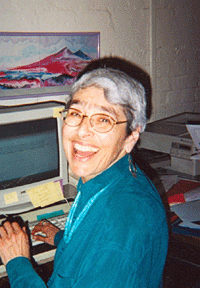Elizabeth Lapovsky Kennedy
Elizabeth Lapovsky Kennedy (1939) is a pathbreaking feminist scholar who has played a central role in creating the field of Women's Studies in the United States as well as made significant contributions to the development of the field of LGBTQ history particularly lesbian history. Kennedy has been a lifelong activist with a passion for social justice which shaped her work in and beyond the academy. Her determined efforts to thoughtfully transform institutions and provide support for younger generations of scholars and activists from marginalized communities have earned her the respect of her students, colleagues, and community members alike. Kennedy is one of the highly regarded foremothers of Women's Studies in the United States and her contributions have included both pioneering scholarship and talented leadership in developing the institutional structures enabling the field to develop. In 1971 she founded one of the first women's studies programs in the country at the University of Buffalo SUNY. On the frontlines of opening this important space for women in the academy- working in tandem with the Women's Liberation Movement- Kennedy shaped the field through her commitment to critical and relevant scholarship that centered on an analysis of gender class sexuality and race. In 1978 Kennedy initiated a community oral history project in Buffalo New York about the lives of working-class lesbian women in the decades before Stonewall. The thirteen-year project developed into the influential Boots of Leather Slippers of Gold: The History of a Lesbian Community (1993) one of the seminal texts on lesbian history in the United States. The book was a collaborative project with her former student Madeline Davis and was the recipient of many awards including the 1994 Jesse Barnard Award 1994 Ruth Benedict Award and a 1993 Lambda Literary Award. After many years at SUNY Buffalo, she joined the Department of Women's Studies at University of Arizona as Department Head in 1998. Through her unparalleled commitment and astounding hard work she successfully advanced the stature stability and contributions of the department. She was instrumental in the hiring of faculty in support of a new Chicana Studies Concentration and she led a major 25th anniversary celebration which included a national conference on the state of the field. On the basis of the conference, she edited a collection of essays Women's Studies for the Future (2007) with another student Agatha Beins. At the University of Arizona Kennedy continued her groundbreaking institutional development by creating the Women's Plaza of Honor. A remarkable achievement at a university like most others whose monuments are mostly dedicated to men the Women's Plaza of Honor stands out for its celebration of women's accomplishments particularly in the Southwest. The Plaza is accompanied by a community history project; Kennedy has worked with students at the University of Arizona to develop skills in women's life writing which they use to write and expand the biographies of the honorees. The Women's Plaza of Honor is also a major fundraising effort for the Department of Gender & Women's Studies which enabled the establishment of a Ph.D. program in 2008. All the while Kennedy has sustained a dynamic commitment to social justice and continued to make significant contributions through her own scholarship. During much of her tenure at the University of Arizona she has persisted in her decades-long effort to interrogate and challenge the pervasive manifestations of racism through her participation on the Anti-Racism Task Force. In the past few years in addition to continuing her research and teaching in LGBTQ history Kennedy also resumed work from the 1960s and 1970s with the Wounaan people in Colombia to counter the devastating effects of imperialism and war in the region. Elizabeth Lapovsky Kennedy's tremendous impact on improving the lives and opportunities for women people of color LGBTQ people and other marginalized groups is immeasurable. Moreover, she is an educator in the best sense of the word and has devoted untold hours to mentoring and developing the intellectual confidence and capacities of her students and junior scholars. Her magnanimous nature courageous leadership and keen intellect have not only enhanced the lives of everyone around her but have left an incredible legacy and inspirational example for future generations.



